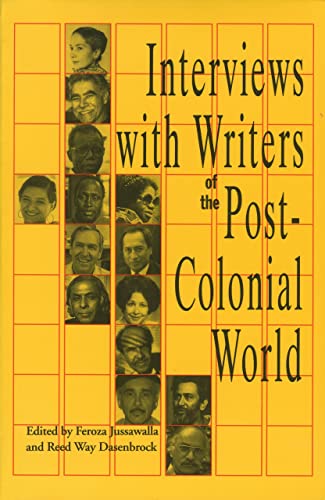
Inhaltsangabe
This book of interviews conducted by Jussawalla and Dasenbrock is the first to feature third-world authors discussing their works and their careers. These are joined by three Chicano writers from the U.S. All fourteen included here write in English, a language they have chosen for their creative expression, and all write their novels at a time when codes of the colonial past are targets of revisionism. In this fascinating collection of fourteen interviews (eleven previously unpublished) the interviewers speak with leading writers from Kenya, Nigeria, Somalia, India, Pakistan, New Zealand, and the Caribbean islands, as well as with three Chicano writers. Largely considered non-canonical, they address questions about the effects of colonialism, their place in English-language literature, the politics of language in non-Western societies, and the value of their work in helping those with Western perspectives to understand their cultures. Noted writers from Africa-Ngugi wa Thiong'o from Kenya and Chinua Achebe from Nigeria--engage in the most important discussion in African literature today, whether or not to write in English. Nigeria's leading feminist writer, Buchi Emecheta discusses the role of women in a primarily male literary environment. South Asian writers are represented by two well-known Indian writers, Raja Rao and Anita Desai, and by two noted Pakistani writers, Zulfikar Ghose and Bapsi Sidhwa. Sharing a common colonial history, these writers generally display less desire to differentiate their work from the Western tradition. The collection also includes an interview with the Somali writer Nuruddin Farah, who is culturally as well as geographically somewhere between the Easternand Western cultures. Also included are four interviews with minority writers from countries where English is the dominant language, the Maori writer Witi Ihimaera from New Zealand and the three Chicano Americans, Rudolfo Anaya, Rolando Hinojosa, and Sandra Cisneros, whose situa
Die Inhaltsangabe kann sich auf eine andere Ausgabe dieses Titels beziehen.
Von der hinteren Coverseite
This book of interviews conducted by Jussawalla and Dasenbrock is the first to feature third-world authors discussing their works and their careers. These are joined by three Chicano writers from the U.S. All fourteen included here write in English, a language they have chosen for their creative expression, and all write their novels at a time when codes of the colonial past are targets of revisionism. In this fascinating collection of fourteen interviews (eleven previously unpublished) the interviewers speak with leading writers from Kenya, Nigeria, Somalia, India, Pakistan, New Zealand, and the Caribbean islands, as well as with three Chicano writers. Largely considered non-canonical, they address questions about the effects of colonialism, their place in English-language literature, the politics of language in non-Western societies, and the value of their work in helping those with Western perspectives to understand their cultures. Noted writers from Africa-Ngugi wa Thiong'o from Kenya and Chinua Achebe from Nigeria--engage in the most important discussion in African literature today, whether or not to write in English. Nigeria's leading feminist writer, Buchi Emecheta discusses the role of women in a primarily male literary environment. South Asian writers are represented by two well-known Indian writers, Raja Rao and Anita Desai, and by two noted Pakistani writers, Zulfikar Ghose and Bapsi Sidhwa. Sharing a common colonial history, these writers generally display less desire to differentiate their work from the Western tradition. The collection also includes an interview with the Somali writer Nuruddin Farah, who is culturally as well as geographically somewhere between the Easternand Western cultures. Also included are four interviews with minority writers from countries where English is the dominant language, the Maori writer Witi Ihimaera from New Zealand and the three Chicano Americans, Rudolfo Anaya, Rolando Hinojosa, and Sandra Cisneros, whose situation is comparable to, yet instructively different from, the situation of Asian and African writers. Two interviews with West Indian or Caribbean writers, Sam Selvon and Roy Heath, complete the collection. These interviews offer a panorama of some of the most exciting writing being done in English today. Readers coming to works of these multilingual writers for the first time will be absorbed by their illuminating commentaries.
Aus dem Klappentext
Interviews with third-world and Chicano authors speaking about their place in the literary canon
„Über diesen Titel“ kann sich auf eine andere Ausgabe dieses Titels beziehen.
Weitere beliebte Ausgaben desselben Titels
Suchergebnisse für Interviews with Writers of the Post-Colonial World
Interviews with Writers of the Post-Colonial World
Anbieter: Books From California, Simi Valley, CA, USA
paperback. Zustand: Good. Book shows minor shelf & handling wear. First page is lightly marked, otherwise pages are clean: text and pictures are intact and unmarred. Artikel-Nr. mon0003813465
Interviews with Writers of the Post-Colonial World
Anbieter: PBShop.store UK, Fairford, GLOS, Vereinigtes Königreich
PAP. Zustand: New. New Book. Shipped from UK. Established seller since 2000. Artikel-Nr. FW-9780878055722
Neu kaufen
Anzahl: 1 verfügbar
Interviews With Writers Of The Postcolon
Anbieter: Kennys Bookstore, Olney, MD, USA
Zustand: New. Artikel-Nr. V9780878055722
Interviews With Writers of the Post-Colonial World
Anbieter: Revaluation Books, Exeter, Vereinigtes Königreich
Paperback. Zustand: Brand New. 312 pages. 8.75x5.75x1.00 inches. In Stock. Artikel-Nr. x-087805572X
Neu kaufen
Anzahl: 2 verfügbar
Interviews with Writers of the Post-Colonial World
Anbieter: moluna, Greven, Deutschland
Zustand: New. KlappentextrnrnInterviews with third-world and Chicano authors speaking about their place in the literary canon. Artikel-Nr. 898941799
Neu kaufen
Anzahl: 1 verfügbar
Interviews with Writers of the Post-Colonial World
Anbieter: AHA-BUCH GmbH, Einbeck, Deutschland
Taschenbuch. Zustand: Neu. Neuware - Interviews with third-world and Chicano authors speaking about their place in the literary canon. Artikel-Nr. 9780878055722
Neu kaufen
Anzahl: 1 verfügbar

